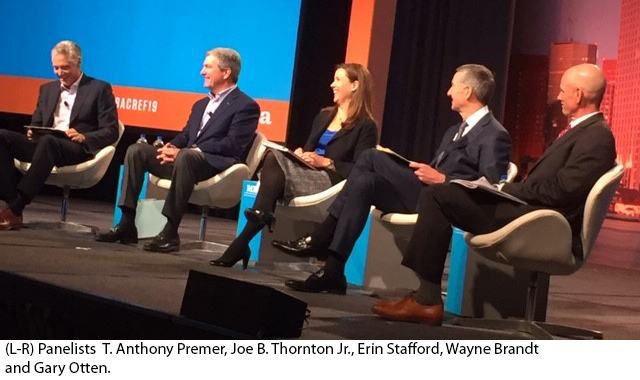
As Markets Change, Execs Stress Strategic Thinking
SAN DIEGO–Commercial real estate debt markets are as competitive as ever, so industry executives need to think strategically, CRE leaders said here at the MBA CREF/Multifamily Housing Convention & Expo’s second general session.
 Commercial real estate has good liquidity and the markets are functioning very well, said Joe B. Thornton Jr., President and Executive Managing Director with HFF “We do a lot of business with global capital,” he said. “It feels like more and more organizations want to get into the CRE space including sovereign wealth funds and state plans and everybody in between. High net worth individuals and family capital are also becoming more comfortable in the CRE space.”
Commercial real estate has good liquidity and the markets are functioning very well, said Joe B. Thornton Jr., President and Executive Managing Director with HFF “We do a lot of business with global capital,” he said. “It feels like more and more organizations want to get into the CRE space including sovereign wealth funds and state plans and everybody in between. High net worth individuals and family capital are also becoming more comfortable in the CRE space.”
Thornton said he does not see any supply problems with the balance between cap rates and the risk-free rate. “It does not make me nervous,” he said, noting he has not seen any change in pace of play or volume.
“First mortgages look very healthy with 60 to 65 percent loan-to-values,” said DBRS Managing Director of Commercial Mortgage-Backed Securities Erin Stafford. “But last year did show some year-over-year net operating income growth stagnation.”
Economists disagree about the odds of a recession in the near future. Wayne Brandt, Managing Director and National Originations Director with Wells Fargo Bank, N.A., said U.C. Berkeley Economist Ken Rosen just released his forecast that estimates a 60 to 80 percent chance of a recession in 2020 or 2021. “Our [Wells Fargo] economists disagree with that; they see a slowing from this year to 2021 [but not a recession],” he said. “It’s a pretty benign forecast. I don’t see anything in either prediction that says we’re heading for a recession right away.”
Gary Otten, Managing Director and Head of Debt Strategies with MetLife, noted no one can predict what might cause a recession. “I’m generally pretty positive on the economy; there is strong consumer confidence,” he said. “What I like about this point in time is that the markets are not complacent. That’s when something can smack you; when people get complacent.”
Otten said all the borrowers he talks to are thinking ahead about the possibility of a recession and how to prepare for it, which increases the odds of a “soft landing” in an economic downturn.
“Real estate is cyclical; there will be another cycle and we want to be prepared,” Stafford said. “In 2006 and 2007 you saw too much pro forma underwriting. We still remember that, so we’re embracing technology to develop systems to do all those risk tests today in anticipation of what might happen.”
Wells Fargo spends considerable time comparing and contrasting loans underwritten between 2007 and 2009 to the underwriting occurring today, Brandt said. “Back then there was pro forma underwriting and 10-year interest-only loans,” he said. “It’s remarkable to compare that to today. We sometimes ‘stop the train’ on a deal and say ‘in 2007 this deal would have had very different underwriting compared to today’.”
